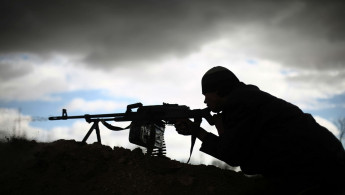Russian attempt to blacklist Syria's Islamist rebels blocked
Britain, France, the United States and Ukraine on Tuesday blocked a Russian request to add two Syrian rebel groups to a UN terror blacklist and sideline them from the Syrian peace process, diplomats said.
Russia had requested that Jaish al-Islam and Ahrar al-Sham be added to the sanctions list for their ties to al-Qaeda and the Islamic State group.
Adding names to the UN sanctions list requires a consensus decision from the 15-member Security Council and after objections were raised by the four countries, Russia's request was rejected.
"Russia publicly attempting to designate groups that are parties to the cessation of hostilities could have damaging consequences to the cessation just as we are trying to de-escalate the situation on the ground," said a spokesperson for the US mission to the United Nations.
"Now is not the time to shift course, but rather double-down on our efforts toward a reduction in violence."
Jaish al-Islam is a member of the Higher Negotiations Committee (HNC) that is taking part in negotiations in Geneva to end the five-year war in Syria.
 |
|
| [Click to enlarge] |
The Saudi-backed rebel group is the most important in Damascus province.
Ahrar al-Sham is among the most powerful Islamist rebel groups in Syria.
Financed by Turkey and Gulf states, it has fought alongside the al-Nusra Front, al-Qaeda's Syria affiliate, around Aleppo and in neighboring Idlib province.
The dispute over the sanctions list came amid word from Moscow Tuesday that the 17-nation International Syria Support Group (ISSG) would meet in Vienna on 17 May to try to get peace efforts back on track.
An attempt last year by the ISSG to come up with a single list of "terrorist" groups in Syria fell apart after scores of names were submitted from all sides.
A Security Council diplomat, who spoke on condition he not be named, said blacklisting the two groups would be "seriously counter-productive, damaging both efforts to maintain the cessation of hostilities and resume peace negotiations in Geneva."
He argued that isolating them from the mainstream opposition would result in a more hardline stance and drive them away from the search for a political settlement.
"It would provide a pretext for yet more moderate areas to come under target," he said.
The Damascus regime has consistently branded all its opponents - armed or not - "terrorists" since the outbreak of war in 2011.





 Follow the Middle East's top stories in English at The New Arab on Google News
Follow the Middle East's top stories in English at The New Arab on Google News
![Israeli forces ordered bombed Gaza's Jabalia, ordering residents to leave [Getty]](/sites/default/files/styles/image_330x185/public/2176418030.jpeg?h=a5f2f23a&itok=_YGZaP1z)

